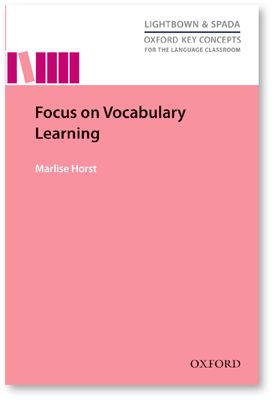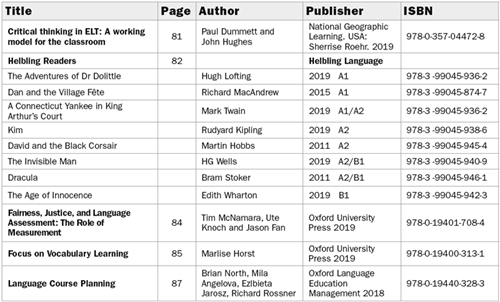Focus on Vocabulary Learning
Focus on Vocabulary Learning
Marlise Horst
Oxford University Press 2019
See page 88 for details

As teachers, we are well aware of the need to teach vocabulary and grammar in the language classroom. Whilst many of the course and state programmes that we follow present us with a ready-made list of grammar items that are to be taught at a particular level, the same is often not true for vocabulary. More often than not, our programmes provide general topic areas that are to be taught, like Pets, Food, Holidays or the Environment etc., but they fail to present us with a practical list of essential vocabulary for each level. Thus, we teachers are pressured to choose the vocabulary that will be worked on in our classrooms. Due to the fact that this is such a colossal task, we often fall into the temptation of blindly accepting the vocabulary proposals in the coursebook that we are following, believing that they have been carefully selected by experts who know better than we do, regardless of whether their choices actively cater for our particular students’ needs or not. Focus on Vocabulary Learning is a great tool to help us begin the process of breaking down the gigantic task of choosing the right vocabulary for our students into manageable steps. Not only does it present the latest research in this field in a practical way that is easy for us teachers to understand, but it also bridges the link between theory and practice by discussing concrete activities and spotlight studies throughout the entire book, which we can easily relate to and adapt for our classrooms. In addition, it helps us finally understand what we instinctively suspect due to our classroom practice: why some students remember the target vocabulary they are exposed to and taught, and others don’t. Although I have been teaching for over 23 years, it has been a while since I decided to dedicate a bit of time to studying more about teaching vocabulary in particular, and so initially I was a little apprehensive that this type of book would contain too many terms and concepts that I might not immediately understand or recall. The Glossary at the end of the book quickly put any qualms that I had to rest, allowing me to quickly come up to speed with any terms that I had forgotten or had not previously come across.
Focus on Vocabulary Learning has been divided into five chapters which are clearly organised and which build on from each other to reach a crescendo about what it means to effectively learn vocabulary. Each chapter begins with a short Preview in which the main goals of the chapter are clearly stated and ends with a brief summary that allows one to revisit the main concepts in the chapter before moving on to the next chapter. The chapters have been organised as follows:
- Vocabulary Knowledge and Learning Goals: This chapter defines what vocabulary learning is and which words are important for learners to know so that we teachers know which words to teach. It moves on to focus on the different dimensions and components of vocabulary development and ends with an analysis of the various components of vocabulary knowledge.
- Learning Vocabulary: Chapter 2 delves into the challenges that children face when learning vocabulary. In order to do so, it presents a brief overview of the principal theories of vocabulary acquisition to help us understand how the human mind learns words. Various strategies are presented to aid information retention to help us design learning activities that are effective and efficient in the classroom.
- Vocabulary Acquisition in Young Learners of English: Chapter 3 takes a closer look at how primary school children develop their vocabulary knowledge as well as how their vocabulary knowledge develops as a result of factors such as socioeconomically advantaged family situations, ample exposure to the target language, increases in cognitive ability and knowledge of their native language, to name just a few. I was struck by the research presented regarding the important role that L1 plays when learning L2.
- Vocabulary Acquisition in Adolescent Learners of English: Chapter 4 discusses how adolescent learners differ from young learners so that the assets that they naturally have can be maximised. It examines how much vocabulary adolescents learn and how fast they are able to do so. A detailed look is taken at the character of teenagers’ developing vocabulary abilities, and various programmes and techniques of effective vocabulary instruction are discussed. The most reassuring section of this chapter for me was the research that highlights the crucial autonomous role that learners have to play in their vocabulary learning process. Due to the vast amount of words that learners are expected to learn and the limited time that we have to expose them to English, it is vital that we train strategies that encourage and support autonomous learning skills so that our students learn to become self-sufficient learners!
- Vocabulary: What We Know Now: In Chapter 1 a questionnaire was presented to help the reader discover their personal beliefs about vocabulary learning before being confronted with all the research in this field. It is fitting that Chapter 5 completes the circle by re-examining the questions and highlighting the possible ‘answers’ which have been presented throughout the book.
The series Editor’s preface explains that this book is part of a series that aims to ‘provide accessible information about research on topics that are important to second language teachers. Each volume focuses on a particular area of second/foreign language learning and teaching, covering both background research and classroom-based studies. The emphasis is on how knowing about this research can guide teachers in their instructional planning, pedagogical activities, and assessment of learners’ progress’ (pxii). In my opinion Focus on Vocabulary Learning clearly meets these aims and goes a step further by challenging one to question and reflect upon one’s views about teaching vocabulary in order to grow as a teacher, rather than simply presenting the reader with a ready-made list of effective vocabulary teaching procedures and activities to implement in the classroom as is often the case in many books of this nature.
Another aspect that makes this book a must-read are the vocabulary tools that are presented throughout the entire book and subsequently organised in the Appendix so that they can easily be located long after one has finished reading. Tools like the Academic Vocabulary List (AVL), the Middle School Vocabulary List (MSVL), lexical frequency profiler tools like the Lextutor multi-concordance tool and the Vocabulary SizeTest (VST) amongst others, can be used back in our classrooms to guarantee that we are well-informed autonomous teachers who are consciously capable of making the most effective and lasting vocabulary choices for our students.
A final aspect that is worth mentioning is the fact that the author, Marlise Horst, is sensitive to the fact that we are busy teachers with limited time for our own research. Thus, she has provided us with a carefully put together list of additional reading material in the section Suggestions for Further Reading at the end of the book to make sure that it is easy to follow up on any interesting topics/aspects that have caught our attention. This is a fantastic note to end on as it reminds one that successful teaching is an active process which requires constant reflective practices regardless of how long one has been teaching for. If you are interested in developing your vocabulary teaching skills or feel that you’d like to develop this area of your teaching, then Focus on Vocabulary Learning is the perfect book to read at the beginning of the Academic year when it is still possible for you to organise teaching vocabulary in the manner that is the most beneficial for your students!
Vanessa Reis Esteves
Vanessa Reis Esteves lives in Portugal and presently writes course material for young learners. She is the author of ETpedia: Young Learners.
Summary of books reviewed

Future issues
If you have any articles on the themes below, I would like to hear from you. Articles should be 1200–1800 words.
For any further information contact me at Robert.mclarty@pavpub.com
Topics for 2020
Summary of books reviewed

Future issues
If you have any articles on the themes below, I would like to hear from you. Articles should be 1200–1800 words.
For any further information contact me at Robert.mclarty@pavpub.com

Comments
Write a Comment
Comment Submitted